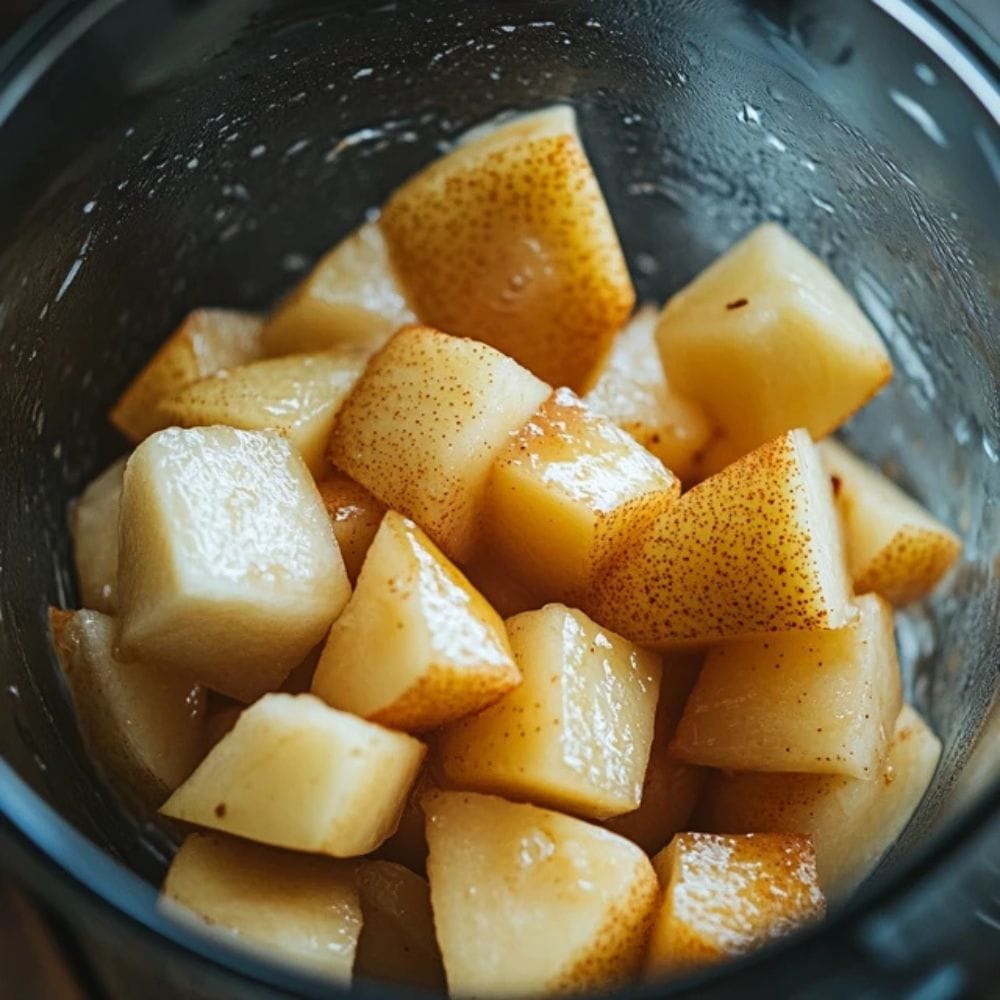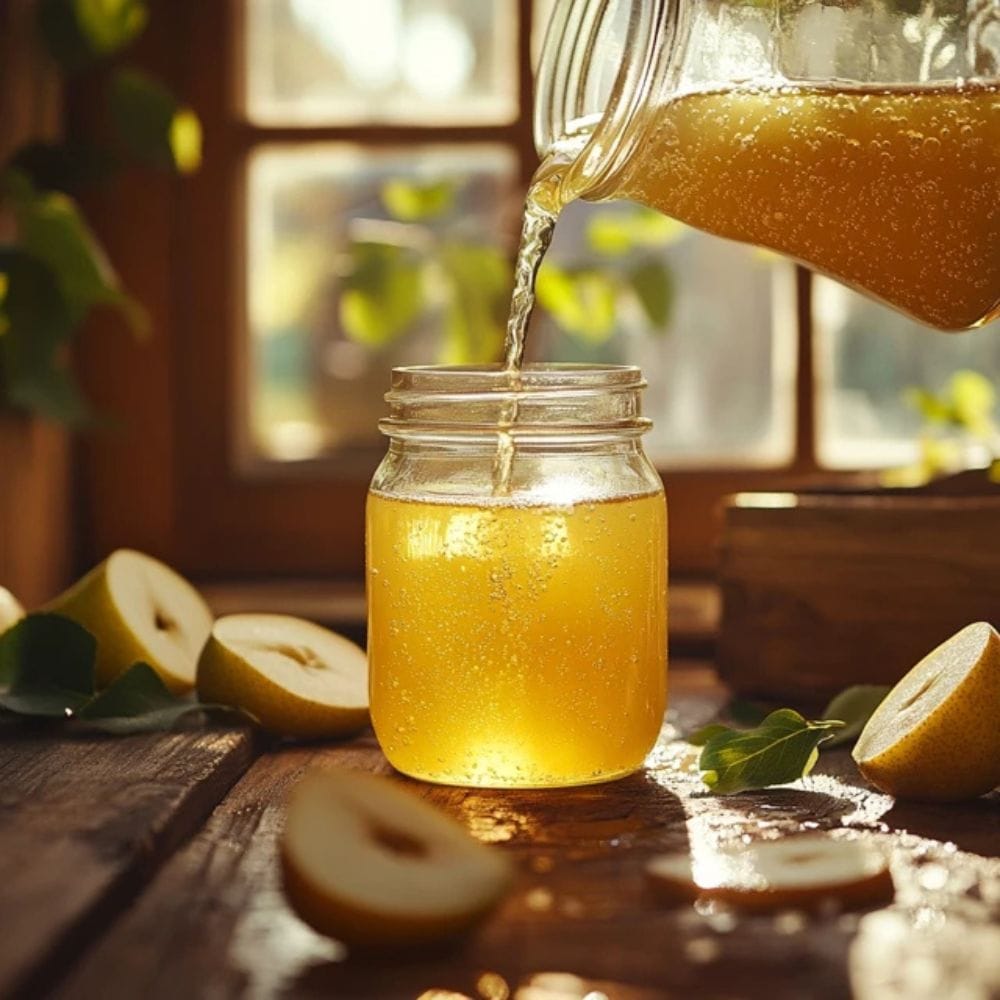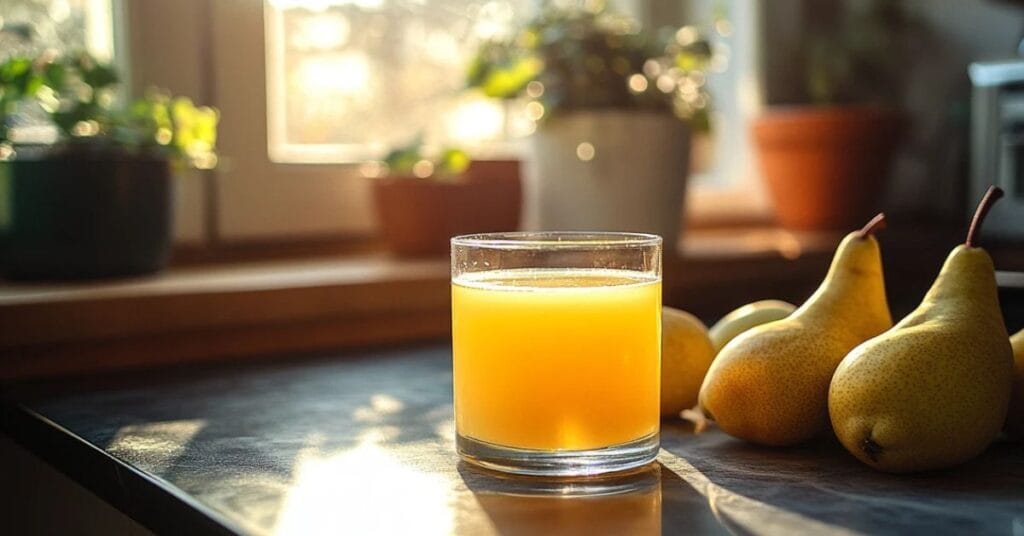Pear juice is a delightful and nutritious drink that offers a burst of flavor while providing an array of health benefits. Derived from fresh, juicy pears, this beverage is not only a treat for your taste buds but also a source of essential nutrients like vitamins, minerals, and dietary fiber. Whether enjoyed as a standalone drink or used as an ingredient in culinary creations, pear juice has earned its place in the spotlight. Its subtle sweetness, combined with its hydrating properties, makes it a favorite among health enthusiasts and food lovers alike.
Understanding Pear Juice
What is Pear Juice?
Pear juice is a liquid extract made by juicing or blending ripe pears. It captures the essence of the fruit, delivering a naturally sweet and slightly tangy flavor. Unlike pear nectar, which often contains added sugars or other ingredients, pear juice is typically more concentrated and pure. Its texture can vary from clear to slightly pulpy depending on how it’s processed.
Not only is it a refreshing beverage, but pear juice also serves as a versatile ingredient in recipes ranging from smoothies to sauces. Its adaptability makes it a staple for culinary enthusiasts and health-conscious individuals alike.
Historical Significance of Pear Juice
Interestingly, pear juice has been appreciated for centuries. In ancient China, pears were revered for their cooling properties and were often juiced for medicinal purposes. Similarly, in Europe, pear-based beverages were popular during the Middle Ages, particularly for their mild sweetness and health benefits. Over time, the humble pear became a global symbol of nourishment and vitality, with its juice continuing to play a vital role in traditional remedies and modern diets.
Nutritional Profile of Pear Juice
Vitamins and Minerals
Pear juice is an excellent source of essential nutrients, offering a combination of vitamins and minerals that support overall health. It is particularly rich in:
- Vitamin C – Plays a crucial role in enhancing the immune system, helping the body fight off infections and promoting skin health by boosting collagen production.
- Vitamin K – Essential for bone health and proper blood clotting, ensuring that wounds heal effectively while maintaining strong bones.
- Potassium – Helps regulate fluid balance, nerve signals, and muscle contractions, contributing to healthy blood pressure levels and reducing the risk of cardiovascular diseases.
- Dietary Fiber – If consumed unstrained, pear juice provides fiber that aids digestion, prevents constipation, and promotes gut health.
Additionally, pear juice contains small yet beneficial amounts of:
- Magnesium – Supports muscle function, nerve signaling, and bone strength.
- Calcium – Important for maintaining healthy bones and teeth while also supporting proper muscle and nerve function.
- Iron – A crucial mineral that aids in oxygen transport in the blood, helping to prevent fatigue and anemia.
The presence of natural sugars in pear juice provides a quick energy boost, making it an excellent beverage choice for those needing a natural source of carbohydrates. Furthermore, its low sodium content makes it heart-friendly, reducing the risk of hypertension and cardiovascular issues.
Caloric Content and Serving Sizes
An 8-ounce (240 ml) serving of pear juice typically contains 120-150 calories, depending on whether it is freshly extracted or commercially processed. This calorie range makes it a moderate-energy beverage, suitable for those maintaining a balanced diet.
When consuming pear juice, it is important to consider the following:
- Fresh juice vs. store-bought juice – Freshly made pear juice contains more fiber and fewer additives, while commercially prepared versions may have added sugars or preservatives.
- Portion control – Drinking pear juice in moderation prevents excessive intake of natural sugars while still providing essential nutrients.
- Best consumption times – Enjoying pear juice in the morning or after physical activity can help replenish energy levels and keep hydration in check.
By incorporating pear juice into a well-rounded diet, individuals can enjoy its refreshing taste while benefiting from its impressive nutritional profile.
For a deeper dive into the nutritional benefits of pears, visit this article.
| Nutrient | Amount per Serving (8 oz) |
|---|---|
| Vitamin C | 10% DV |
| Potassium | 195 mg |
| Dietary Fiber | 2 g (if unstrained) |
| Calories | ~120-150 |
Health Benefits of Pear Juice
Digestive Health
Pear juice is a natural remedy for digestive wellness, thanks to its fiber content and natural compounds. When consumed with some pulp, it becomes an excellent digestive aid, offering the following benefits:
- Promotes regular bowel movements – The dietary fiber in pear juice helps add bulk to stools, facilitating smooth digestion and preventing constipation.
- Acts as a mild laxative – Pears contain sorbitol, a natural sugar alcohol that has a gentle laxative effect, making it a suitable choice for individuals struggling with irregular bowel movements.
- Supports gut health – Pear juice helps nourish beneficial gut bacteria, contributing to a healthy digestive microbiome that aids in overall nutrient absorption and metabolism.
- Eases digestive discomfort – Due to its hydrating nature and soothing properties, pear juice can help alleviate bloating and mild stomach discomfort, particularly after heavy meals.
Drinking pear juice regularly, especially in its unstrained form, can naturally support digestion and prevent gastrointestinal issues without the need for artificial laxatives.
Antioxidant Properties of Pear Juice
Loaded with antioxidants, pear juice serves as a powerful drink that helps the body combat oxidative stress and inflammation. Some of its key antioxidant benefits include:
- Rich in flavonoids and vitamin C – These compounds neutralize free radicals in the body, reducing cellular damage that can lead to chronic illnesses.
- Fights inflammation – The anti-inflammatory properties of pear juice can help soothe conditions such as arthritis, gout, and inflammatory bowel diseases, making it a beneficial drink for those prone to chronic pain.
- Supports heart health – Antioxidants play a role in reducing oxidative stress in blood vessels, which helps lower the risk of heart disease and improve overall cardiovascular function.
- Aids in diabetes prevention – Regular consumption of antioxidant-rich foods and beverages like pear juice may help reduce insulin resistance, lowering the likelihood of developing type 2 diabetes.
- Boosts skin health – The combination of vitamin C and flavonoids in pear juice can improve skin elasticity, reduce wrinkles, and promote a glowing complexion by fighting free radicals responsible for premature aging.
By incorporating pear juice into a balanced diet, individuals can enjoy not only its refreshing taste but also its numerous digestive and antioxidant benefits, making it a valuable addition to a health-conscious lifestyle.
For more insights into the health benefits of pears, explore this resource.
How to Make Pear Juice at Home
Selecting the Right Pears for Juicing
Choosing the perfect pear variety is the first step toward making exceptional pear juice. Opt for ripe yet firm pears, as they deliver the best balance of sweetness and juiciness. Varieties like Bartlett, Bosc, or Anjou are excellent choices, each offering a unique flavor profile. Bartlett pears, for instance, are known for their sweetness, while Bosc pears bring a slightly spiced flavor.
Inspect the fruit closely for blemishes or bruises, as these can affect the juice’s taste. Additionally, ensure the pears are fully ripened, as underripe fruit may result in a tart and less palatable juice. Remember, fresh and organic pears are ideal for maximizing nutritional benefits.
Step-by-Step Recipe

Making it at home is straightforward and requires minimal ingredients. Here’s a simple guide to creating a delicious and nutritious beverage:
- Wash and Prep the Pears
Begin by thoroughly washing the pears to remove any dirt or pesticides. Peel the fruit if desired, although keeping the skin can add extra fiber to the juice. Core the pears to remove seeds. - Blend or Juice
Place the prepared pears in a blender with a splash of water. Blend until smooth. If you own a juicer, simply process the pears directly through the machine for a pulp-free consistency. - Strain or Serve
For a smoother texture, pour the blended mixture through a fine mesh strainer or cheesecloth. Press gently to extract all the liquid. - Enhance the Flavor
Add a squeeze of lemon juice to prevent oxidation and enhance the taste. For a hint of spice, consider adding ginger or cinnamon. - Serve Fresh
Pour the juice into a glass and serve immediately for the best flavor and nutrient retention.
For a detailed homemade pear juice recipe, check out this guide.
| Equipment Needed | Ingredients |
|---|---|
| Blender/Juicer | 4 ripe pears |
| Strainer/Cheesecloth | 1 cup water (optional) |
| Knife and Cutting Board | Lemon juice (optional) |
Enhancing Flavor
Transforming your pear juice into a gourmet delight is as simple as adding a few complementary flavors. For instance, a dash of fresh ginger or a sprig of mint can provide a refreshing twist. Similarly, blending the juice with other fruits like apples or oranges creates a richer and more complex flavor profile.
Not only can these additions enhance the taste, but they can also amplify the nutritional content. For example, adding a touch of turmeric increases the anti-inflammatory benefits, while honey or maple syrup can elevate the sweetness naturally.
Incorporating Pear Juice into Your Diet
Smoothies and Cocktails
Pear juice serves as an excellent base for smoothies and cocktails, making it a versatile addition to your beverage repertoire. Combine it with spinach, banana, and almond milk for a nutrient-packed smoothie. Alternatively, use pear juice as a mixer for cocktails like a pear mojito or a sparkling pear spritzer.
Experimenting with pear juice in these ways can add depth and flavor to your creations, whether they’re designed for health or indulgence.
Cooking and Baking

Beyond beverages, pear juice is a valuable ingredient in the kitchen. It can be used to glaze meats like chicken or pork, infusing them with a mild sweetness. Additionally, it makes an excellent base for sauces or marinades, enhancing both flavor and texture.
In baking, pear juice can replace some or all of the liquid in recipes for cakes, muffins, or breads. The result is a subtle pear flavor that elevates the overall dish without overwhelming other ingredients.
| Uses | Examples |
|---|---|
| Smoothies | Pear, spinach, and banana blend |
| Cocktails | Pear mojito or sparkling pear spritzer |
| Cooking | Glazes for chicken or pork |
| Baking | Cakes, muffins, and breads |
Hydration and Detox
Hydrating Properties of Pear Juice
Pear juice is a fantastic choice for staying hydrated, thanks to its high water content and natural electrolytes. Unlike sugary sodas or artificial drinks, pear juice provides a refreshing way to replenish your body’s fluid levels while also delivering essential nutrients. Its natural sugars offer a quick energy boost, making it an ideal post-workout drink.
Moreover, its potassium content helps regulate fluid balance, further enhancing its hydrating effects. Drinking pear juice regularly can contribute to maintaining optimal hydration, especially in warmer climates or during intense physical activity.
Detoxifying Effects
The natural compounds in pear juice, such as antioxidants and dietary fiber, make it an excellent addition to detox diets. These components work together to support liver function, aiding the body in flushing out toxins more effectively. Additionally, the juice’s mild laxative properties can promote regular bowel movements, which is essential for a successful detox process.
Not only that, but pear juice is also gentle on the stomach, making it suitable for those with sensitive digestive systems. Its alkalizing effect can help balance the body’s pH levels, further contributing to overall detoxification.
Commercial vs. Freshly Made
Nutritional Differences
When comparing store-bought pear juice to freshly made versions, the nutritional disparities are significant. Commercially available juices often contain added sugars, preservatives, and artificial flavors, which can detract from their health benefits. On the other hand, homemade pear juice is free from these additives, retaining its full nutritional value.
Fresh pear juice is typically richer in vitamins, minerals, and antioxidants. The absence of heat processing ensures that these nutrients remain intact, offering maximum health benefits. If you’re seeking the purest form of pear juice, making it at home is undoubtedly the best option.
| Comparison Aspect | Freshly Made Juice | Commercial Juice |
|---|---|---|
| Nutrient Content | High in vitamins and fiber | Reduced due to processing |
| Additives | None | Sugars, preservatives, and flavors |
| Taste | Pure and fresh | Often overly sweetened |
Additives and Preservatives in Commercial Pear Juice
Many packaged pear juices include additives to extend shelf life and enhance flavor. These additives, while useful for commercial purposes, can impact the juice’s healthfulness. For instance, added sugars increase calorie content and may lead to weight gain if consumed in excess. Preservatives, although generally safe, may cause sensitivities in some individuals.
Additionally, artificial flavors and colors, commonly found in store-bought juices, detract from the natural essence of pears. To avoid these drawbacks, opt for labels that state “100% pear juice” with no added sugars or better yet, make your own at home for complete control over the ingredients.
“Freshly made juice ensures you enjoy all the benefits without any unwanted extras.”
For more information on the nutritional differences between commercial and fresh juices, explore this article.
Potential Side Effects and Considerations
Allergies Related to Pear Juice
Although rare, some individuals may experience allergic reactions to pear juice. Symptoms can range from mild oral irritation, such as itching or tingling of the lips and throat, to more severe reactions like hives or difficulty breathing. These allergies are often linked to a condition called oral allergy syndrome (OAS), where individuals allergic to certain pollens react to fruits like pears.
If you suspect an allergy, consult with a healthcare professional before including pear juice in your diet. Testing for specific allergies can provide clarity and help you enjoy this nutritious beverage safely.
Blood Sugar Levels
Pear juice contains natural sugars, which may cause spikes in blood sugar levels if consumed in excess, particularly by individuals with diabetes or insulin resistance. While the juice has a lower glycemic index compared to some other fruit juices, it’s important to practice portion control.
Adding fiber-rich pulp back into the juice or pairing it with protein can help moderate blood sugar responses. Monitoring consumption ensures that you enjoy the benefits of pear juice without compromising your health.
“Those with specific health conditions should always assess their diet choices carefully.”
Storing and Preserving
Refrigeration and Shelf Life
Freshly made juice should ideally be consumed immediately to preserve its nutrients and flavor. However, if storage is necessary, refrigerate the juice in an airtight container. Under optimal conditions, it can last for up to 3 days. Adding a splash of lemon juice can help delay oxidation, keeping the juice fresh for longer.
For those who prefer to prepare juice in larger batches, proper storage is key. Ensure containers are clean and sealed tightly to prevent contamination. It’s also advisable to keep the juice away from direct light, as this can degrade its nutrient content.
Freezing
Freezing is an excellent method for extending the shelf life of the juice. To freeze, pour the juice into ice cube trays or airtight freezer-safe containers, leaving a small gap at the top to allow for expansion. Once frozen, the juice can be stored for up to 6 months without significant loss of quality.
Thawing the juice in the refrigerator overnight ensures it retains its flavor and nutritional value. For convenience, frozen pear juice cubes can be added directly to smoothies or used as a base for soups and sauces.
| Storage Method | Duration | Tips |
|---|---|---|
| Refrigeration | Up to 3 days | Use airtight containers; add lemon juice. |
| Freezing | Up to 6 months | Store in freezer-safe containers. |
FAQs About Pear Juice
Can I Drink it Daily?Is it Suitable for Children?Does it Help With Weight Loss?Can it Cause Digestive Issues?What Are the Best Pear Varieties for Juicing?
Final Thoughts
Pear juice is a versatile and nutritious beverage that offers a wealth of benefits. From supporting hydration and digestion to serving as a key ingredient in recipes, it is both practical and delightful. Making pear juice at home ensures you maximize its natural goodness while avoiding unnecessary additives found in commercial products






